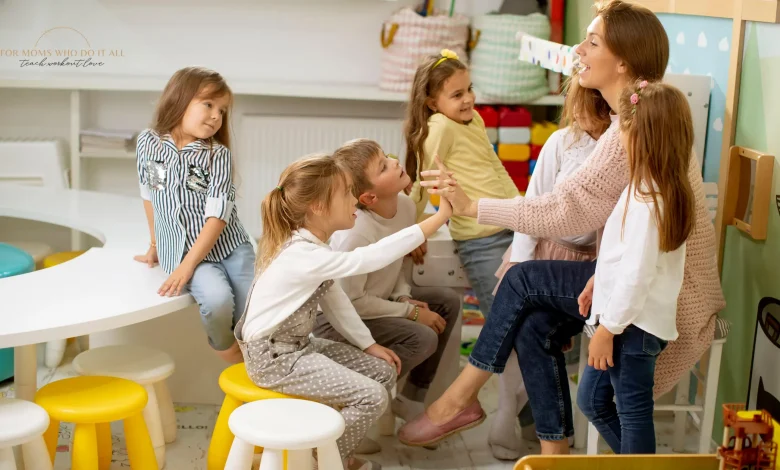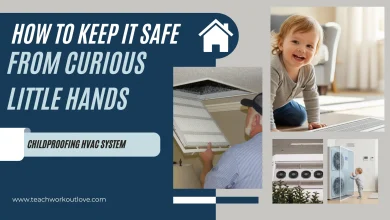
Finding the right childcare is vital for new and repeat parents alike. It’s about safety, trust, and knowing your little one is spending their day in a place that truly supports their growth.
Touring centers or meeting with in-home providers can feel overwhelming. Everything looks tidy for your visit, staff are on their best behavior, and your kiddo is probably clinging to your leg.
So Lillio has collaborated with TeachWorkoutLove to create a childcare checklist to make the process that much easier.
Top 10 Childcare Checklist
1. Safety and Cleanliness
Check for signs of neglect in something as simple as housekeeping, or an effective check-in process.
Simple measures to keep the environment safe and secure go a long way in showing how much the centre prioritizes your child’s safety.
- Strong Security Measures
(locked entry, visitor sign-in, ID checks)
- How do they handle emergencies?
(fire drills, severe weather, medical emergencies)
- What’s the cleaning routine?
(sterile bathrooms, clean toys, clear surfaces)
- Are the classrooms childproofed?
(covered outlets, secured shelves, safe play areas)
Some are apparent with a tour, but others might require some inquiry.
2. Staff Qualifications and Coverage
Teachers and caregivers are the heart of childcare, their experience and attitude set the tone for your child’s day. Do caregivers kneel down to talk at a child’s level? Do they look patient and engaged with your child?
Pay attention to the little things while you check out more logistical concerns like”
- How many members of staff are working with the children?
(More staff = more attention for your child)
- What qualifications or certifications do caregivers have?
(CPR, early childhood education, ongoing training)
- How are rules and safety measures implemented with the children?
(Time-outs, redirection, trust building)
- How are the staff empowered to enforce policy with adults?
(De-escalation, clear protocol, security measures)
3. Daily Routines and Curriculum
Even toddlers benefit from structure. The right balance of learning and play sets kids up for success.
- What does a typical schedule look like?
(Circle time, art, outdoor play, meals, rest)
- Do they follow a curriculum?
(Even for infants, tracking development milestones matters)
- How much outdoor time do children get?
(How much is structured activities like sports or team games?)
- Is screen time part of the day?
(If so, how much and what kind of content?)
Ask how learning is documented. Many centers now use platforms like Lillio’s curriculum and milestone tracking, where teachers can record observations, capture photos, and share progress directly with families.
Read Also: Protecting Your Child’s Health
4. Meals, Snacks, and Nutrition
What your child eats away from home impacts everything from behavior to health. How much they’re enjoying their lunches and snacks will make a big difference in their day.
- How are meals and snacks provided?
- Are the options balanced and kid-friendly?
- How do they handle allergies and dietary restrictions?
- Are staff trained on EpiPens or food allergy safety?
If food is included, ask for a copy of a sample menu. It’ll tell you a lot about their priorities.
5. Communication with Parents
Consistent, clear communication builds trust between parents and staff. You never want a narrow look into what your child’s day to day life is like. Regular updates keep parents in the loop about what’s going on on the playmat.
- How do teachers share daily updates?
(apps, emails, notes, or pickup chats)
- What do incident records look like?
(apps, emails, notes, or pickup chats)
- Are parents welcome to drop in?
(Unannounced visits signal transparency)
- How do staff document milestones?
You want to know how your child is doing, and not just when something goes wrong.
Many centers use Lillio’s parent communication app, where teachers log naps, meals, activities, and send instant updates with photos and notes.
6. Policies on Illness and Absences
Every parent knows germs spread quickly. The right policies protect both your child and others.
- What’s the sick child policy?
- How do they handle medication records?
- What’s the plan if your child gets sick during the day?
Some centers use systems like Lillio’s digital health and incident tracking, so if your child develops symptoms or if multiple illnesses pop up, parents are notified right away.
7. Costs, Fees, and Extras
Childcare is an investment. Clarity about costs upfront saves surprises later.
- What’s the tuition schedule?
- Late or missed payment policies?
- Are there registration or supply fees?
- What about late pickup fees?
Ask for a written fee breakdown. Lillio’s billing and enrollment tools means you can manage tuition digitally. Making it simple for parents to pay online and track exactly what’s included.
Read Also: Childproofing HVAC System
8. Philosophy and Culture
Every center has its own feel and culture that is built by the staff and administration. It exists as the environment your child will grow up in.
This philosophy will shape every detail of how children are taught, comforted, and encouraged.
- Is the focus play-based, academic, or a blend?
- How do teachers nurture social-emotional growth?
- Do they celebrate diversity and inclusion?
- How are children comforted when upset?
Trust your gut. Can you picture your child thriving in this environment?
9. Parent Involvement and Community
Childcare works best when parents and providers see each other as partners. Tools like Lillio’s family engagement features help bridge that gap by making collaboration smoother between home and classroom.
- Are parents invited to volunteer or visit during the day?
- Are there family events, parent-teacher conferences, or workshops?
- Do they have an open-door policy for questions or concerns?
Some centers encourage parents to be part of the experience, others prefer hands-off. It’s your decision what is right for your child and your parenting approach.
10. The “Gut Check” Questions
This is the most important part of choosing your childcare. It’s not just a list of items, it’s a massive part of you and your child’s life.
- Did the children look happy and engaged?
- Did the staff seem warm, patient, and present?
- Was the space clean, bright, and safe?
- Did you feel welcomed or brushed aside?
Sometimes it’s not about the answers, it’s about how you feel while you’re there.
A Fresh Start, Made Simpler
Finding childcare is a huge decision, but having the right checklist helps you stay focused on what matters most: your child’s well-being and your peace of mind.
And if you find a center using Lillio, you’ll know they’re prioritizing not just care, but also reliable communication and child first education.
Right now, get 3 months free of Lillio and a special bonus gift to start off the school year right~
Trusted by thousands of centers across North America, Lillio helps you focus less on logistics and more on what matters most.




